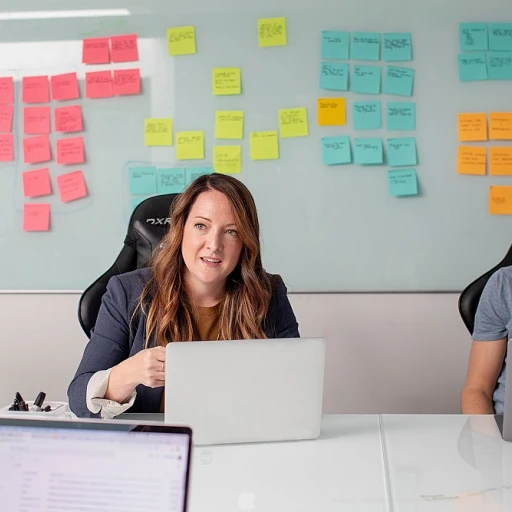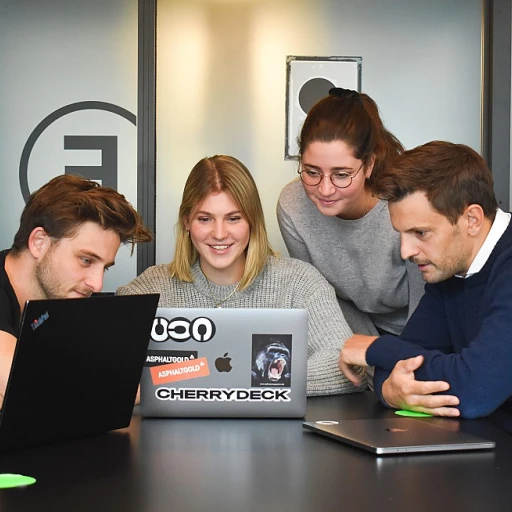
Understanding the Skills Gap
Bridging the Gap: A Crucial Step for Companies
Understanding the skills gap is pivotal for any organization aiming to thrive in today’s competitive market. But what is a skills gap? Simply put, it is the difference between the skills that employers need from their workforce and the skills that candidates actually possess. This gap can impede a company’s growth and efficiency, making it essential for hiring managers to evaluate potential employees thoroughly during the interview process. A skills gap analysis is not just about identifying the technical skills necessary for a role, but also about recognizing the soft skills that will ensure a good cultural fit within the team. These skills often include communication skills, critical thinking, and problem-solving abilities. Asking the right interview questions will help in identifying whether a candidate has these competencies. This can range from situational interview questions to questions that describe a time when candidates had to overcome a challenge. A thoughtful assessment of a candidate's fit within the company culture is equally important. Questions can be tailored to evaluate how well a candidate’s values align with those of the company, ensuring that they will seamlessly integrate into the team and thrive in their new position. Moreover, the skills gap isn’t just about current needs; it’s also about future readiness. Employers should be open to the fact that continuous learning and development are crucial for employees to stay relevant in their roles. Therefore, considering if a candidate is willing to evolve and learn over time will give a company a competitive edge. For more insights on how this affects overall employment compensation, exploring the link between company benefits and employee satisfaction can lead to long-term success: How Employee Benefits Influence Total Employment Compensation.Identifying Core Competencies
Pinpointing the Core Skills Needed for Achieving Success
When evaluating potential employees, one of the primary steps is identifying the core competencies that are crucial for the role. These competencies include both hard and soft skills that the candidate must possess to thrive in the job. By understanding which skills are most valued, you can effectively craft interview questions that assess these areas thoroughly.
Here are some key considerations when identifying these competencies:
- Define the Position Requirements: Clarify the specific technical abilities and qualifications needed to fulfill the position. This will make it easier to align candidates with the role.
- Evaluate Communication Skills: Assess the importance of communication skills. Whether for collaboration or client interactions, communication is often a critical aspect of company culture.
- Consider Problem-Solving Abilities: In many roles, the ability to tackle unexpected challenges is invaluable. Develop skills interview questions that evaluate a candidate's problem-solving and critical thinking capabilities.
It's vital to remember that these competencies should align with the company culture and the existing team. Crafting a set of questions that merge technical requirements with a culture fit assessment will provide a holistic view of the candidate's potential.
For more insights on understanding employee skills gaps, you can explore our comprehensive analysis of these challenges.
Crafting Effective Interview Questions
Formulating Interview Strategies
Crafting effective questions during the hiring process is crucial for judges about a candidate's potential to thrive in a particular role within the company. It's essential to differentiate between soft skills and technical competencies to glean a holistic understanding of the person's capabilities.- Start with situational interview questions that allow candidates to describe a time when they employed problem-solving or critical thinking. These queries will help evaluate their ability to handle real-world situations efficiently.
- Incorporate behavioral interview questions. Such questions help reveal how a candidate has managed similar roles, emphasizing their communication skills and adaptability within a team environment.
- Utilize questions that help discover cultural fit. Asking candidates about their perception of the company's values and dynamics—aligned with company culture and cultural fit—can predict how comfortably they will integrate.
- Pose questions that job related to continuous learning. Understanding how candidates develop their skills over time aids in evaluating their long-term value to the company.
Evaluating Transferable Skills
Translating Skills for Different Roles
Understanding the necessity of evaluating transferable skills is crucial in hiring the right candidate for any position. In the dynamic job landscape, the demand for adaptability is more prevalent than ever. Companies are increasingly relying on candidates who can bring unique perspectives and experiences to a role, even if their previous job titles do not directly align with the new position. Transferable skills are those competencies that can be applied across various roles and work environments. These abilities often include soft skills such as communication skills, critical thinking, and problem solving. During the interview process, it’s beneficial to ask questions that allow candidates to illustrate how they have previously utilized these skills in different scenarios.- Behavioral Interview Questions: These allow the candidate to describe a time when they successfully navigated challenges or showcased leadership skills. For instance, "Can you describe a time when you had to solve a complex problem at work?" This supports assessing how candidates might transfer those problem-solving skills to your team.
- Situational Interview Questions: Propose hypothetical scenarios to understand how the candidate might handle various aspects of the role. For example, "How would you handle a situation where you need to communicate important ideas across multiple departments?" This evaluates their communication skills and capacity for collaboration.
- Common Interview Questions: Standard questions such as "What skills have you acquired in your previous roles that you think will be most useful here?" help to gauge how the candidate perceives their own skills and their fit for the company.
Assessing Cultural Fit
Evaluating the Cultural Alignment
When hiring for a new position, assessing whether a candidate will fit into your company culture is as crucial as evaluating their skills. A candidate's ability to integrate well with your team can significantly impact their success and overall job satisfaction. Here’s how you can determine cultural fit during the interview process:
- Understand Your Company Culture: Before you can evaluate candidates, you need a clear understanding of your own company culture. Reflect on your core values, work environment, and the traits that define your team dynamics.
- Ask Behavioral Interview Questions: These questions help uncover how candidates have handled situations in the past. For instance, ask them to describe a time they had to work with a difficult team member. Their answer will help you gauge their communication skills and adaptability.
- Use Situational Interview Questions: Pose hypothetical scenarios to candidates to see how they would react in specific situations. This will help you assess their problem-solving abilities and whether their approach aligns with your company’s values.
- Evaluate Soft Skills: Attributes like empathy, critical thinking, and collaboration are essential for cultural fit. During the interview, observe how candidates communicate and interact with the team. This will give you insights into their interpersonal skills.
- Consider Team Dynamics: Involve team members in the interview process to get diverse perspectives on the candidate's fit. Their input can be invaluable in assessing whether the candidate will integrate well with existing team members.
- Assess Long-Term Compatibility: Consider whether the candidate’s career goals align with the company’s direction. This alignment is crucial for retention and ensuring the candidate is motivated to grow within the company.
By carefully evaluating these aspects, you can ensure that the candidates you choose not only fill the role but also contribute positively to the company culture. A strong cultural fit can lead to a more cohesive and productive team, ultimately benefiting the company as a whole.
Continuous Learning and Development
Paving the Path Toward Skill Enhancement
In today's ever-evolving corporate landscape, onboarding candidates is only the beginning. Ensuring that your employees continue to grow and succeed in their roles is a significant component of a well-rounded hiring strategy. Here, continuous learning and development come into play as vital elements that can secure a company's competitive edge and enhance each candidate's success.
Many common interview questions do well to assess existing capabilities, but understanding a candidate's willingness and ability to learn new skills will help highlight their potential within the company. It's crucial to approach the job interview not solely as a test of current skills but also as a gauge of a candidate's adaptability and eagerness to improve. This can be determined by crafting questions that probe how a candidate might proactively fill their own skills gap, or describe a time when they had to quickly learn something new on the job. Evaluating such soft skills is a hallmark of the interview process.
- Identifying Learning Preferences: During the interview, ask candidates how they prefer to develop their skills. Whether they lean toward hands-on experiences, traditional training programs, or digital courses can give you insights into how they will fit into your company culture.
- Focus on Problem Solving: Use situational and behavioral interview questions. These types of questions help gauge how candidates have demonstrated critical thinking and problem-solving skills in past roles, thus indicating potential growth areas.
The best interview practices not only focus on the present role but also future development opportunities. Encouraging a candidate's growth can also bolster their engagement and satisfaction, positively contributing to the team and, by extension, the business's success.
Remember, assessing the cultural fit remains an essential part of this process. The candidate's adaptability to the company culture should align with their professional growth trajectory. This alignment ensures they not only fill the current position but are also poised for progression within the company, contributing over time to a more skilled and comprehensive team.













